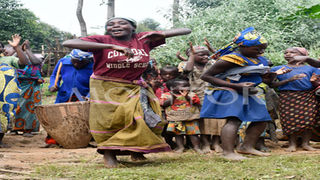
The Batwa perform their energetic dance to earn a living from tourism. PHOTO/EDGAR R BATTE
|Life
Prime
Batwa: Pitiable forest people with superb entertainment
What you need to know:
- Life’s irony. The deplorable living conditions do not dampen the mood of the Batwa in Bwindi, writes Edgar R. Batte.
No two visits to a place are the same and a visit to the Batwa community only gets more fascinating. Batwa do not have so much but share so much joy that would leave you doubting whether life is about fast cars and swanky homes.
This group lives a largely rudimentary life. Their shelters are semi-permanent, houses put together with mud, twigs and pieces of wood and grass or banana fibre thatch or iron sheets.
They eagerly wait on tourists to earn through collectively singing, dancing, demonstration of the traditional way of making fire as well as selling handicrafts that portray, among others, the prized mountain gorilla in neighbouring Bwindi Impenetrable National Park, a place that was once their home.
They also weave baskets that serve as decor utensils as well as traditional food serving items. At the sight of visitors, many become animated. A mother with a baby strapped to her back raises her hands to catch the attention of a tourist while her other children indifferently look on.
The children
Some of the children are half dressed, in their mothers’ cardigans and seated on bare ground. Many share a joke that gets them laughing out loudly. In a split second, they begin converging and a woman carries a big drum to the fore while another quickly fetches stashes of dry banana leaves and takes them to a man who later squats, picks a stick, asks for the leaves and arranges them on the ground.
As the group starts singing, he lowers his upper body, energetically rubbing the stick between his hands as he fastens it in between the dry banana leaves.
Within seconds, smoke rises from the leaves.
He slowly blows air into the leaves as more smoke rises, and flames of fire almost immediately start rising to the chagrin of tourists who are amazed at the rudimentary fire-making process that defines the Batwa’s, and certainly Africa’s historical way of life.
At the achievement of making fire, its maker’s face beams, his lips splitting into a smile that reveals his dark gums and set of yellowed teeth. The crowd of entertainers and tourists collectively claps to allude him for the mini fete.
Mesmerised, one of the photographers in the audience asks to have a turn at trying his hand at the craft too. It is after three attempts that he manages to flame the banana leaves.
The energetic dance
In elation, he jumps in the air, hands raised.
The children with mucus running down their noses are drawn into the moment and clap, which by reflex the older folks get into another session of dance and singing.
One agile dancer pulls off some moves, akin to breakdance as he effortlessly wiggles his waist in coordination with his upper body and hands. Even the dullest soul would be hard pressed not to smile because everyone is happy.
Batwa are natural entertainers whose joy adds colour, life, and warmth to chilly Nkuringo section. Tourist Oliver Alice wrote on TripAdvisor, travel platform that the Batwa dance and cultural stories left her wondering how God created unique people with unique art, and craft that is so interesting.
“It was a great moment watching Batwa cultural dance and left with me with a memorable experience,” Alice adds.
Dreyer from Cape Town Central, South writes, “I liked everything about the Batwa, the songs, dance, demonstrations how they used to harvest herbs for medicine and wild honey, the old ways of fetching water and construction demo of grass thatched huts they used to live are all amazing. A fee of $80 is charged by Uganda Wildlife Authority, an organisation in charge of the trail to benefit the local community and their families.”
Unsightful
Pitiable is the sight of children who have mothered others because the living condition of their community is deplorable.
ALSO READ: Landless Batwa long for return to forests
Peeping into their huts one notices; small shared space crammed with beds made of dry tree branches, perhaps for the head of family and his wife.
The children sleep on the bare ground of mud wattle. A spear in a corner, is most likely for memorabilia to remind the family about how the forefathers went out to hunt and gather food and fruit from the Bwindi Impenetrable Forest.
There, they are no longer allowed to set foot for such activities as part of efforts to conserve mountain gorillas that have since become a much sought-after tourism attraction.

The Batwa have a belief that a Mutwa loves the forest as much as he loves his body.
Did you know?
Today, the Batwa comprise about 0.2 per cent of the population in Uganda. They are subsistence farmers. Their share of tourism is partly through tourist visits which cost US$25 (approx. Shs87,000).





